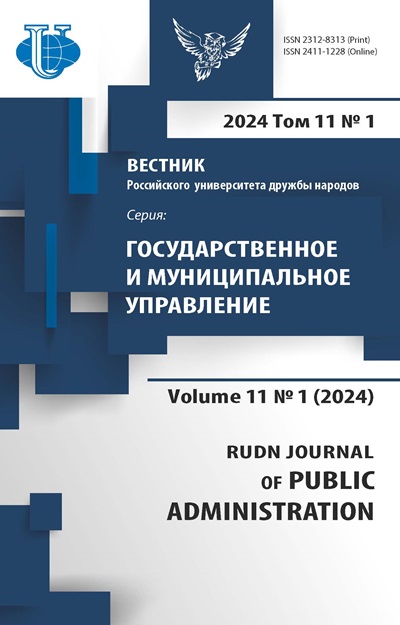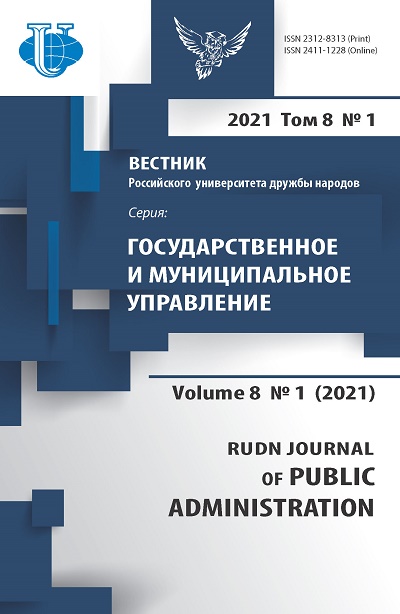Infodemia: Concept, Social and Political Consequences, Methods of Managing
- Authors: Borkhsenius A.V.1
-
Affiliations:
- Peoples’ Friendship University of Russia (RUDN University)
- Issue: Vol 8, No 1 (2021)
- Pages: 52-58
- Section: Public administration: theory and practice
- URL: https://journals.rudn.ru/public-administration/article/view/25926
- DOI: https://doi.org/10.22363/2312-8313-2021-8-1-52-58
Cite item
Full Text
Abstract
The article is devoted to the consideration of the “infodemia” phenomenon as a result of massive fakes injections associated with the 2019-nCoV pandemic. Author analyzes the global social and political consequences of disinformation in social networks and messengers on the topic of health, official health statistics and government methods to combat the spread of the virus. There is a decrease in trust to government authorities and official information sources and also an increase in the popularity of conspiracy narratives. Author identifies methods to deal with infodemia and analyzes their effectiveness.
Keywords
About the authors
Alexandra V. Borkhsenius
Peoples’ Friendship University of Russia (RUDN University)
Author for correspondence.
Email: alex.borkhsenius@yandex.ru
ORCID iD: 0000-0002-8592-3538
Assistant of the Department of State and Municipal Management
6, Miklukho-Maklaya str., Moscow, Russian Federation, 117198References
- Yablokov I. Russkaya kul’tura zagovora. Konspirologicheskie teorii na postsovetskom prostranstve [Russian Culture of Conspiracy. Conspiracy Theories in the Post-Soviet Space]. Moscow: Alpina non-fiction; 2020: 39 (In Russ.).
- Facebook i «VKontakte» udalili fejki o koronaviruse v Rossii [Facebook and VKontakte Have Removed Fakes about Coronavirus in Russia]. Izvestiya. 10.03.2020. URL: https://iz.ru/985194/2020-03-10/facebook-i-vkontakte-udalili-feiki-o-koronaviruse-v-rossii. Accessed: 10.03.2020. (In Russ.).
- Koronavbros: Rossiya boretsya s lozhnoj informaciej ob epidemii COVID-19 [Coronavbros: Russia Is Fighting False Information about the COVID-19 Epidemic]. Izvestiya. 04.03.2020. URL: https://iz.ru/983363/dmitrii-laru/koronavbros-rossiia-boretsia-s-lozhnoi-informatciei-ob-epidemii-covid-19. Accessed: 04.03.2020 (In Russ.).
- UN Tackles ‘Infodemic’ of Misinformation and Cybercrime in COVID-19 Crisis. United Nations. URL: https://www.un.org/en/un-coronavirus-communications-team/un-tackling-%E2%80%98infodemic%E2%80%99-misinformation-and-cybercrime-covid-19. Accessed: 31.03.2020.
- Rekomendacii VOZ dlya naseleniya v svyazi c rasprostraneniem novogo koronavirusa (2019-nCoV): mify i lozhnye predstavleniya [WHO Recommendations for the Public in Connection with the Spread of the New Coronavirus (2019-nCoV): Myths and Misconceptions]. World Health Organization. 23.11.2020. URL: https://www.who.int/ru/ emergencies/diseases/novel-coronavirus-2019/advice-for-public/myth-busters. Accessed: 08.09.2020. (In Russ.).
- Free Press Unlimited. URL: https://www.freepressunlimited.org/en/covid19. Accessed: 16.09.2020.
- Covid 19 Misinfo. URL: https://www.covid19misinfo.org. Accessed: 01.10.2020.
- “Fake about the Coronavirus”. For the First Time, Facebook Deleted Donald Trump’s Post, Twitter Blocked his Headquarters. BBC. 06.08.2020. URL: https://www.bbc.com/ russian/news-53674003. Accessed: 06.08.2020 (In Russ.).
- Sittmann J. New Insights in the Battle against Misinformation. DW Akademie. 10.07.2020. URL: https://www.dw.com/en/new-insights-in-the-battle-against-misinformation/a-54075437. Accessed: 10.07.2020.
- Medvedev S. Epidemiya i infodemiya [Epidemic and Infodemic]. Radio Svoboda. 18.03.2020. URL: https://www.svoboda.org/a/30492846.html. Accessed: 18.03.2020 (In Russ.).
- Brewer J. Anxiety Is Contagious. Here’s How to Contain It. Harvard Business Review. 18.03.2020. URL: https://hbr.org/2020/03/anxiety-is-contagious-heres-how-to-contain-it. Accessed: 18.03.2020.
- Nitsche L. Digital Authoritarianism on the Rise? DW Akademie. 15.05.2020. URL: https://www.dw.com/en/digital-authoritarianism-on-the-rise/a-53445949. Accessed: 15.05.2020.
















